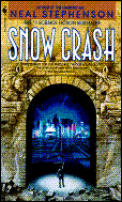
| Publisher: | Bantam |
| Copyright: | June 1992 |
| Printing: | May 1993 |
| ISBN: | 0-553-56261-4 |
| Format: | Mass market |
| Pages: | 470 |
Snow Crash has one of the most effective opening hooks in science fiction, a loving description of a high-tech armored driver and car. A man with a mission. A man with wonderful high-tech toys and samurai swords, who works for the Mafia doing one of the few things that the United States still does better than any other country in the world.
High-speed pizza delivery.
It's a beautiful setup, even if the pizza delivery job doesn't last far beyond the opening pages. It introduces the reader to Hiro Protagonist ("Stupid name." "But you'll never forget it."), the skateboard courier Y.T., and some of the major players and political structure of Stephenson's future Los Angeles. Even better, it effectively introduces Stephenson's off-beat world, in which things like Mafia-owned pizza chains and franchised private countries guarded by dogs with nuclear power packs not only prompt an amazed chuckle, they start to make a bizarre amount of sense.
The easiest box to put Snow Crash into is cyberpunk humor, and it certainly works as that. Stephenson's characters approach an insane, satirical world with an unflappable, sarcastic attitude, full of choice comments and well-timed skewering of idiots. But he's not content to just give the reader humorous ideas. He digs beneath the surface, filling out the corners and edges with bits of trivia and extrapolation, resulting in a highly improbable world that feels, while reading, like a living, breathing place just a few exaggerations around the corner from our own.
Nowhere does this come across as well as in Stephenson's Metaverse, the cyberpunk on-line shared world that pretty much everyone spends some time in. It has the standard mix of avatars, private offices, elaborate shared spaces, constant advertising, dangerous computer viruses, elite hackers, and guarded corporate havens. However, unlike nearly every other cyberpunk world I've read about, it also makes sense to someone who knows computers. Stephenson shows not just the effects but the causes, including digressions on why it's tricky to write a proper invisible avatar, old mapping hacks that have become dangerous because they patch too deeply into core code, social discrimination against the crappy avatars that one gets from using public terminals, and a beautiful sword-fighting routine Hiro wrote just for his own amusement that ends up having useful side effects. It's wonderful to read cyberpunk where the computer elements, even if suffering from occasional mistaken extrapolation, feel like actual computers instead of fantasy magic, and the hidden bits feel just like the sort of thing real hackers would embed in their code.
The plot of Snow Crash rests on an idea that isn't quite as believable. Someone has developed an information virus that affects people, not just computers, and the resulting fast-paced detective work and running fight scenes involve religion, archeology, and ancient Sumerian myth. Stephenson kept me believing for a surprisingly long time, throwing in bits of trivia about Enki, the writing of the Old Testament, and the history of monotheism that are real if obscure corners of research. But neuro-linguistic viruses that attack the human brain similar to how computer viruses infect computers are a bit much, and the final explanation of just what's going on is several pages of rather unbelievable infodump. (A shame, too, since the infodumping in the rest of the book is done mostly through dialog with a computer program and manages to be entertaining and well-paced.)
That and the one horribly bad sex scene are about the only weaknesses, though, and both are fairly ignorable. The rest of the book is an exciting action romp through a hilarious semi-dystopian future and the well-constructed on-line Metaverse world. Snow Crash has an amazing density of "cool shit": skateboard smart wheels, the Rat Things, Ng's over-the-top elaboration of a mobile wheelchair, everything about the Black Sun, experimental computer-controlled gatling guns, Uncle Enzo and his family approach to pizza franchises, Raven and his unassailable position as the ultimate badass. The list goes on and on, and it's all presented with infectious enthusiasm. One gets the feeling Stephenson's mind is overflowing with more ideas to add to the world and can't wait to show the reader another one. Add in two extremely likeable main characters (Y.T. is one of my favorite characters in SF, although I have a well-known liking for that sort of character so take that with a grain of salt) and you have a book I can't believe never won a major award.
This is the book that made Stephenson's reputation as a science fiction writer, and it's still one of the best books he's ever written. This is my second read of it, continuing the tradition of anniversay reviews of books I loved but read before I started writing reviews, and it was every bit as good as I remembered. The ending was even better than I remembered; Stephenson commonly gets a bad rap for abrupt or poor endings, and he doesn't tell you quite as much as you might want to know about what happens to all of the characters, but on this re-read I found the ending satisfying and entirely sufficient.
If you've not read this one before, you're in for a treat. Highly recommended.
Reviewed: 2005-11-29